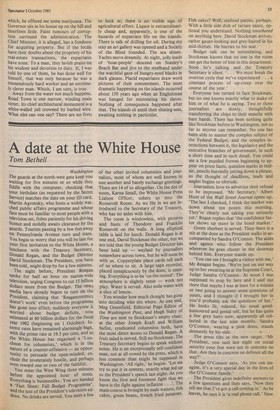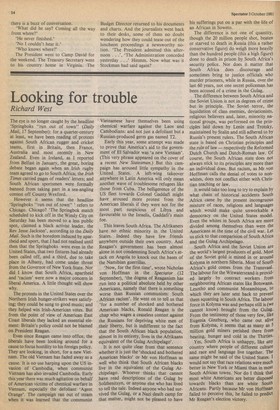A date at the White House
Tom Bethell
Washington The guards at the north-west gate keep you waiting for five minutes or so while they fiddle with the computer, checking that Your birthdate (as requested by the Secret Service) matches the date on your ID card. Martin Agronsky, who hosts a widely watched public affairs programme and whose face must be familiar to most people with a television set, fishes patiently for his driving licence and stolidly awaits clearance by the guards. Tourists passing by a few feet away on Pennsylvania Avenue turn and stare. You begin to worry that you will be late for Your first invitation to the White House, a luncheon with the Treasury Secretary, Donald Regan, and the Budget Director David Stockman. The President, you have been told, might drop by for a few minutes.
The night before, President Reagan Spoke for half an hour on nation-wide television, urging Congress to cut 15 billion dollars more from the Budget. The news media have already begun to turn on the President, claiming that 'Reaganonomics doesn't work' even before the programme has gone into effect; suddenly everyone is worried about budget deficits, now estimated at 60 billion dollars for the fiscal Year 1982 (beginning on 1 October).1nterest rates have remained alarmingly high, with the prime rate at 19.5 per cent, and so the White House has organised a:Luncheon for columnists,' which is in the nature of a counter-offensive — an opportunity to persuade the open-minded, exclude the inveterately hostile, and perhaps even reward one or two of the faithful.
You enter the West Wing three minutes before the appointed hour of noon. 'velYthing is businesslike. You are handed a 'Fact Sheet: Fall Budget Programme', and the text of the President's television address. No drinks are served. You meet a few of the other invited columnists and journalists, most of whom are well known to one another and barely exchange greetings. There are 14 of us altogether. On the dot of noon, Karna Small, the White House Press Liaison Officer, ushers us into the Roosevelt Room. As we file in we are introduced to the Secretary of the Treasury, who has no aides with him.
The room is windowless, with pictures and busts of Theodore and Franklin Roosevelt on the walls. A long elliptical table is laid for lunch. Donald Regan is at one end, David Stockman the other, but we are told that the young Budget Director has been held up — waylaid by journalists somewhere across town, but he will soon be with us. Copperplate place cards tell each of us where to sit. A large tape recorder, placed conspicuously by the door, is running. Everything is to be 'on the record'. The atmosphere is slightly tense — work not play. Water is served. Also soda water with a slice of lemon. You wonder how much thought has gone into deciding who sits where. At one end, Meg Greenfield, Editorial Page Editor of the Washington Post, and Hugh Sidey of Time are next to Stockman's empty chair; at the other Joseph Kraft and William Satire, syndicated columnists both, have the most direct access to Donald Regan. A fruit salad is served. Still no Stockman. The Treasury Secretary begins to speak without notes. He is an exceptionally self-confident man, not at all cowed by the press, which is less common than might be supposed in Washington. 'All right,' he begins. 'Let me try to put it in context, exactly what led up to the President's speech last night. As you know the first and foremost fight that we have is the fight against inflation. . .'. The main course is brought by male waiters, fish cakes, green beans, french fried potatoes. Fish cakes? Well, seafood patties, perhaps. With a little side dish of tartare sauce, optional you understand. Nothing smothered on anything here. David Stockman arrives, rather gaunt-looking and grey-haired in his mid-thirties. He hurries to his seat.
Budget talk can be intimidating, and Stockman knows that no one in the room can get the better of him in this department.
Soon he's talking and the Treasury Secretary is silent. . . We must break the overrun cycle that we've experienced . . . a constant process of up-creep over the course of the year.'
Everyone has turned to face Stockman, but no one knows exactly what to make of him or of what he is saying. Two or three journalists are slowly, thoughtfully transferring the chips to their mouths with bare hands. There has been nothing quite like Stockman before in Washington, not as far as anyone can remember. No one has been able to master the complex subject of the Federal Budget, and the complex interactions between it, the legislative and the executive branches of government, in such a short time and in such detail. You could see a few puzzled frowns beginning to appear on press faces, question marks in midair, pencils hurriedly jotting down a phrase, as the thought of deadlines, leads and angles begins to obtrude.
Journalists love to advertise their refusal to be impressed. `Mr Secretary,' Albert Hunt of the Wall Street Journal opens up, 'The last I checked, I think the market was down about ten points this morning.
They're clearly not taking you seriously yet.' Regan replies that 'the confidence factor shows up more in the bond market.' Green sherbert is served. Then there is a stir at the door as the President walks in ac companied by Sandra O'Connor. The aides and agents who follow the President wherever he goes cluster in the doorway behind him. Everyone stands up.
'You can see I brought a visitor with me,' Mr Reagan begins. 'We're just on our way up to her swearing-in at the Supreme Court, Judge Sandra O'Connor. At noon I was supposed to stop by here and I said out there that maybe I was at least for a minute or two going to answer some questions of yours, and I thought if I brought her in you'd probably ask the questions of her.'
He looks fit, relaxed, his usual goodhumoured and genial self, but he has quite a few grey hairs now, apparently all collected in the last nine months. Sandra O'Connor, wearing a pink dress, stands demurely by his side.
The press tilts at the new target. `Mr President, you said last night on social security your feet were not in concrete on that. Are they in concrete on defence all the way?'
Judge O'Connor says, 'As you can imagine, it's a very special day in the lives of the O'Connor family.'
The President gives indefinite answers to a few questions and then says, 'Now they tell me that I've got a call coming in.' As he leaves, he says it is 'a real phone call.' Now there is a buzz of conversation.
'What did he say? Coming all the way from where?'
'He never finished.'
'No I couldn't hear it.'
'Who knows where?'
The President went to Camp David for the weekend. The Treasury Secretary went to his country home in Virginia. The Budget Director returned to his documents and charts. And the journalists went back to their desks, some of them no doubt wondering how they could tease out of the luncheon proceedings a newsworthy notion. 'The President admitted this after noon . . 'The Administration conceded yesterday . . Hmmm. Now what was it Stockman had said again?







































 Previous page
Previous page